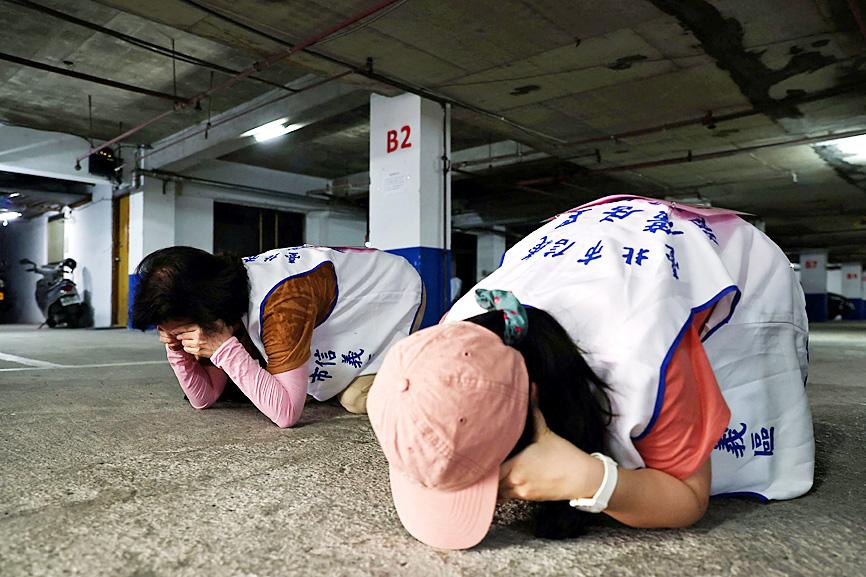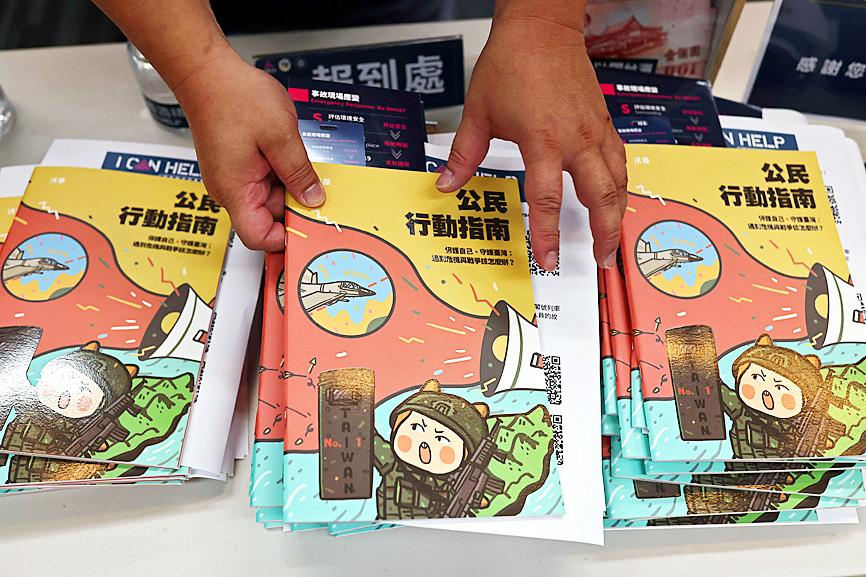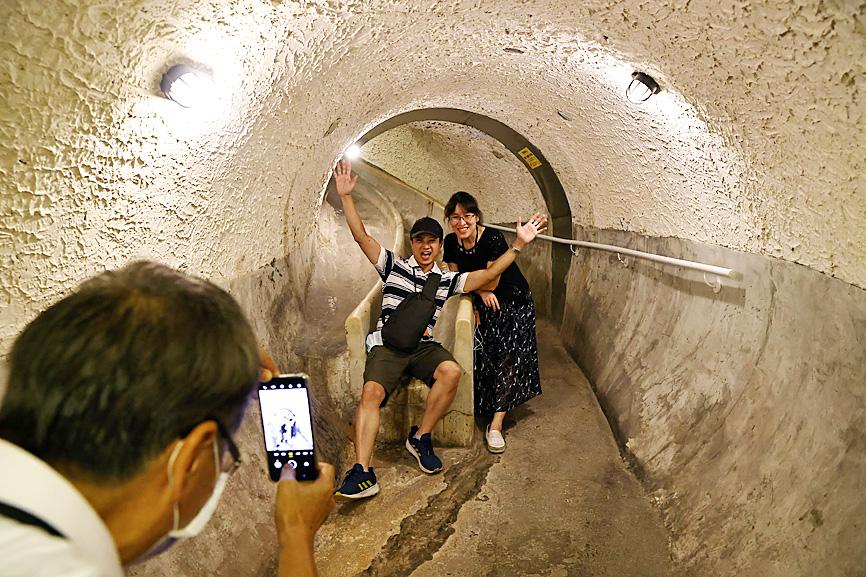Taiwan is preparing air-raid shelters as rising tension with China and Russia’s invasion of Ukraine raise new fears about the possibility of a Chinese attack.
China has in the past few years increased military activity in the air and seas around Taiwan, which vows to defend itself and has made strengthening its defenses a priority, with regular military and civil defense drills.
The preparations include designating shelters where people can take cover if Chinese missiles start flying in — not in purpose-built bunkers, but in underground spaces like basement car parks, the subway system and subterranean shopping centers.

Photo: Ann Wang, Reuters
Taipei has more than 4,600 such shelters that can accommodate about 12 million people, more than four times its population.
Harmony Wu, 18, was surprised to learn that an underground shopping concourse where she and other youngsters were recently rehearsing some dance moves would be turned into an air-raid shelter in the event of war.
However, she said she could understand why.

Photo: Ann Wang, Reuters
“Having shelter is very necessary. We don’t know when a war might come and they are to keep us safe,” Wu said. “War is brutal. We’ve never experienced it, so we aren’t prepared.”
Taipei officials have been updating their database of designated shelters, putting their whereabouts on a smartphone app, and launching a social media and poster campaign to make sure people know how to find their closest one.
Shelter entrances are marked with a yellow label, about the size of an A4 piece of paper, with the maximum number of people it can take.

Photo: Ann Wang, Reuters
A senior official in the city office in charge of the shelters said events in Europe had brought a renewed sense of urgency.
“Look at the war in Ukraine,” Taipei City Construction Management Office official Abercrombie Yang said.
“There’s no guarantee that the innocent public won’t get hit,” he said, adding that that was why the public had to be informed. “All citizens should have crisis awareness... We need the shelters in the event of an attack by the Chinese communists.”
Last month, Taiwan held a comprehensive nationwide Han Kuang military exercise for the first time since the COVID-19 pandemic disrupted regular drills.
Among the instructions citizens received in case of incoming missiles was to get down in their basement parking lots with their hands covering their eyes and ears while keeping their mouths open — to minimize the impact of blast waves.
Some civil defense advocates say more needs to be done.
Authorities are required by law to keep the shelters clean and open, but they do not have to be stocked with supplies like food and water.
Researchers in the Legislative Yuan in June called for shelters to be provided with emergency supplies.
Democratic Progressive Party Legislator Enoch Wu (吳怡農) said the public must prepare survival kits to take with them when they seek shelter.
“What’s important is what you bring with you, for people to stay there for a long period of time,” Wu said, citing medical supplies and even tools to build a makeshift toilet.
After decades of saber-rattling across the Taiwan Strait, many Taiwanese appear resigned to living with the threat of a Chinese invasion.
“I’m not stressed. I carry on with my life as usual. When it happens, it happens,” said Teresa Chang, 17, who was also going through her paces at the underground dance practice.

POSITIVE DEVELOPMENT: Japan and the US are expected to hold in-depth discussions on Taiwan-related issues during the meeting next month, Japanese sources said The holding of a Japan-US leaders’ meeting ahead of US President Donald Trump’s visit to China is positive news for Taiwan, former Japan-Taiwan Exchange Association representative Hiroyasu Izumi said yesterday. After the Liberal Democratic Party’s landslide victory in Japan’s House of Representatives election, Japanese Prime Minister Sanae Takaichi is scheduled to visit the US next month, where she is to meet with Trump ahead of the US president’s planned visit to China from March 31 to April 2 for a meeting with Chinese President Xi Jinping (習近平). Japan and the US are expected to hold in-depth discussions on Taiwan-related issues during the

‘LIKE-MINDED PARTNER’: Tako van Popta said it would be inappropriate to delay signing the deal with Taiwan because of China, adding he would promote the issue Canadian senators have stressed Taiwan’s importance for international trade and expressed enthusiasm for ensuring the Taiwan-Canada trade cooperation framework agreement is implemented this year. Representative to Canada Harry Tseng (曾厚仁) in an interview with the Central News Agency (CNA) said he was increasingly uneasy about Ottawa’s delays in signing the agreement, especially as Ottawa has warmed toward Beijing. There are “no negotiations left. Not only [is it] initialed, we have three versions of the text ready: English, French and Mandarin,” Tseng said. “That tells you how close we are to the final signature.” Tseng said that he hoped Canadian Prime Minister Mark Carney

President William Lai (賴清德) yesterday bestowed one of Taiwan’s highest honors on Saint Vincent and the Grenadines (SVG) Ambassador Andrea Clare Bowman in recognition of her contributions to bilateral ties. “By conferring the Order of Brilliant Star with Grand Cordon on Ambassador Bowman today, I want to sincerely thank her, on behalf of the Taiwanese people, for her outstanding contribution to deepening diplomatic ties between Taiwan and SVG,” Lai said at a ceremony held at the Presidential Office in Taipei. He noted that Bowman became SVG’s first ambassador to Taiwan in 2019 and

A man walks past elementary school artworks at the Taipei Lantern Festival in Ximen District yesterday, the first day of the event. The festival is to run from 5pm to 10pm through March 15.